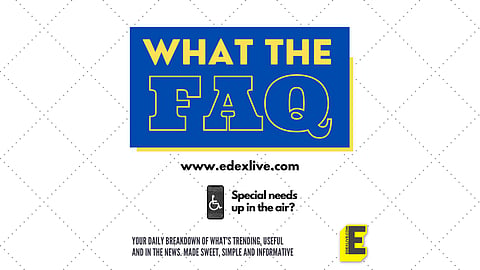

IndiGo found itself in the eye of the storm on Saturday, May 7, as it refused to permit a child with special needs to board a Ranchi to Hyderabad flight. While the child's family decided to not board the flight as their child was not permitted, the airport officials offered accommodation and sent the family to their destination on another flight the next day.
This incident was all over social media as it sparked discussions and debates on the treatment meted out to those with disabilities and on the facilities that are available to them. The controversy came to the attention of Civil Aviation Minister, Jyotiraditya Scindia, and he was compelled to set up a team to investigate the incident further.
What actually happened that day and why? Is this the first instance of mistreatment of a person with disabilities or have there been more? We are here with all the answers on #WhatTheFAQ.
What actually happened?
A family along with their differently-abled adolescent was travelling from Ranchi to Hyderabad via an IndiGo flight. Although all the boarding formalities were followed and cleared by officials, the child was not allowed to board the flight. In spite of requesting several times, the flight authorities were adamant about not allowing the young one to board the aeroplane citing the reason that he was in a "state of panic".
What does the law say?
According to the Central Government Act, Section 24A in The Aircraft Rules,1937:
No person shall knowingly carry or permit to be carried, or connive at the carriage of, a person suffering from any mental disorder or epilepsy in any aircraft: Provided that this prohibition shall not apply if the person to be carried is certified by a registered medical practitioner to be fit to travel by air without being a risk to other passengers or to the aircraft, and in addition —
(a) has not taken or used any alcoholic drink or preparation within twelve hours of the commencement of the flight;
(b) is kept under proper sedative, if in a state of excitement, during the flight and stops en route; and
(c) is accompanied by an attendant, provided that in case he has been in a state of excitement requiring sedation within the two weeks preceding the date of commencement of the flight, he shall be accompanied by a registered medical practitioner and adequate escort who shall individually and collectively be responsible for ensuring that no alcoholic drink or preparation is taken by the person in their charge and that such person is kept suitably sedated during the flight and stops en route.
What did the authorities and the IndiGo CEO have to say about it?
"We have received a report from the airline. We have decided to conduct a fact finding enquiry, which shall be done by a three-member team from DGCA. They will visit Ranchi and Hyderabad where the family stays and collect appropriate evidence within one week from today. Based on the outcome of the said enquiry, further action shall entail," Arun Kumar, Head of DGCA, said.
"Throughout the check-in and boarding process, our intent of course was to carry the family. However, at the boarding area, the teenager was visibly in panic. While providing courteous and compassionate service to our customers is of paramount importance to us, the airport staff, in line with the safety guidelines, were forced to make a difficult decision as to whether this commotion would carry forward aboard the aircraft," IndiGo CEO Ronojoy Dutta said.
Additionally, the CEO also offered to buy an electric wheelchair for the boy.
"There is zero tolerance towards such behaviour. No human being should have to go through this! Investigating the matter by myself, post which appropriate action will be taken," tweeted Civil Aviation Minister Jyotiraditya Scindia.
Has this happened before?
Yes, mistreating those who are disabled has created its space in history in several states.
In March 2022, disabled rights activist Rajiv Ranjan was charged Rs 2,500 for his wheelchair at Chennai airport. It may be noted that he is actually part of the committee which was formed by the Ministry of Civil Aviation for framing draft guidelines to make air travel smoother for people with disabilities. The same person faced a similar incident in 2017 as well.
In 2012, a passenger with cerebral palsy was forcibly deboarded from a Spice Jet flight as the crew feared her disability might pose a health risk during the course of the flight.
In September 2011, GoAir airlines offloaded a blind woman and her two children from the flight from Mumbai.
In May 2011, a blind woman was asked to disembark from a Mumbai-to-Goa Kingfisher Airlines flight.
In future, can we hope that such instances will see a reduction?
Over the years, these incidents have been recurring and the Aviation Ministry has always stepped forward to sort these differences, but there seems to be no end to it.
Neha Arora, founder of Planet Abled, a travel firm which provides accessible travel solutions for people with disabilities, said that such problems occur because the government and companies are not yet sensitive to intellectual or cognitive challenges. “DGCA’s regulation on how to treat disabled passengers is age-old and doesn’t recognise the developmental challenges,” she said, as reported by Business Standard.
